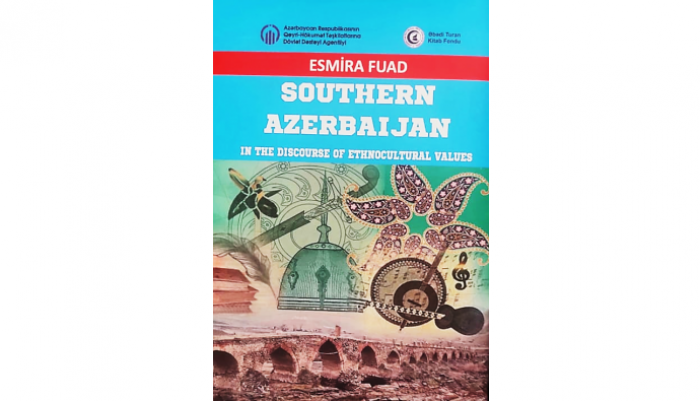
The book by Esmira Fuad, Doctor of Philology, Associate Professor, Head of the Ebedi Turan Book Foundation, “Southern Azerbaijan in the discourse of ethnocultural values” has published in Azerbaijani in 2024, was published in English with the financial and moral support of the Agency for State Support to Non-Governmental Organizations of the Republic of Azerbaijan in an elegant layout (“Southern Azerbaijan in the discourse of ethnocultural values”) with the aim of conveying the realities of Azerbaijan, issues related to the life, culture and literature of our southern compatriots to English-speaking readers and the world. The book was translated into English by Shafa Aliyeva, a leading researcher at the Nizami Ganjavi Institute of Literature of the National Academy of Sciences, PhD in Philology, Associate Professor. In the "Southern Azerbaijan in the discourse of ethnocultural values", the book first includes the Kurekchay Treaty - the official document confirming Azerbaijan's first defeat against Russia, which reflects the historical realities that led to the division of the ancient Oghuz-Turkic homeland - the Oath Commitment, the Gulustan Treaty signed in the village of Gulustan near the Zeyva River in the Karabakh estate, and the infamous Turkmenchay "Peace" treaty with all its clauses. And the role of these treaties, whose names say "peace" but whose content reflects the division of Azerbaijan, which had been one and the same for centuries, in the division of one homeland, one people into two, is analyzed. Later, the real situation of Azerbaijani Turkish, which is being shackled in Iran, the planned Persianization of names of Turkish origin in all of Iran and Southern Azerbaijan in stages and the continuation of the process today, are brought to the agenda based on real facts, and even the reflection of this extremely painful issue in literature is touched upon, Historical monuments of Southern Azerbaijan: Our living stone memory in Tabriz is leafed through, Customs and traditions in Southern Azerbaijan: Chilla night - Chilla holiday, Novruz, Khidr Allaz-Khidr Nabi and the history, present day and penetration of the Gurban holidays into the lives of the people are brought to a literary level this time in the international status English language, which is known and spoken freely by the majority of the world's peoples...
The book “Southern Azerbaıjan ın the dıscourse of ethnocultural values” has published in English explains the peculiarities of South Azerbaijan cuisine, which reflects the unity of taste and richness with nationality. The issue of the drying of Lake Urmia, which is the second biggest problem of South Azerbaijan Turks after the problem of their native language, is examined based on historical facts, many genres of South Azerbaijan folklore and oral folk literature, which are echoes of people's life and national identity, are analyzed based on examples, and examples of Tabriz folklore are examined from the perspective of Sureyya Khan Shapshal. Asif Ata's (Efendiyev) thoughts on South Azerbaijan are explained. The state of prose in the South, "Flash Fiction": The emergence of matchstick stories, the feminism movement in Southern literature, the poetic attitude of writers on the other side towards women, issues of translated literature and publishing are addressed, the real situation and works submitted for publication are briefly discussed, and the discourse of Victory in Azerbaijani literature as a whole is analyzed.
The real situation of Azerbaijani Turkish, which is shackled in Iran, the planned Persianization of names of Turkish origin in all of Iran and South Azerbaijan in stages and the continuation of the process today, is brought to the agenda based on real facts, and even the reflection of this extremely painful issue in literature is touched upon... The historical monuments of South Azerbaijan - our living stone memory in Tabriz are reviewed, the customs and traditions of South Azerbaijan - the Chilla night-Chilla holiday, Novruz, Khidr Allaz-Khidr Nabi and the history and present day of the Gurban holidays, and their penetration into the life of the people are presented on a literary level.
The book also provides artistic examples reflecting the pain of a divided homeland.
In the last chapter titled “Victory discourse in the whole Azerbaijani literature, this and that”, Esmira Fuad, who makes a “brief excursion into our history”, notes that “during the course of the 44-day war, which has no analogues in history, a new era - the “war literature” of the 21st century - began to emerge in 2020-2023, and provides information about this literature, writing that on the eve and in the post-war period, Southern writers dedicated poems, poems and prose works to Karabakh and our new history of honor written in the 44-day war.
Southern activists admit that the statements of the President of the Republic of Azerbaijan, Supreme Commander-in-Chief, Mr. Ilham Aliyev, from time to time supporting the existence and struggle of Southern Azerbaijani Turks, give great moral strength to the Southern people. The statement of our head of state “We will do our best to protect our way of life, the secular development vector of Azerbaijan and Azerbaijanis, including Azerbaijanis living in Iran. They are part of our people...", "The young generation in the Turkic world should have the opportunity to receive education in their native language in the countries where they live, in schools. Unfortunately, the majority of the 40 million Azerbaijanis living outside the borders of the Azerbaijani state are deprived of these opportunities", - attention is drawn to his statement.
The book "Southern Azerbaijan in the discourse of ethnocultural values" also contains 23 scientific articles based on deep analysis and logic, and each of these articles is a valuable source for reading, learning, thinking, and turning pages in the history of the irrevocable struggle of the Southern Azerbaijani Turks for national identity.
